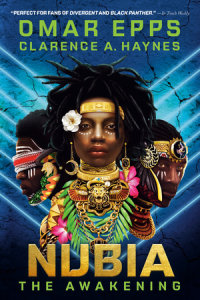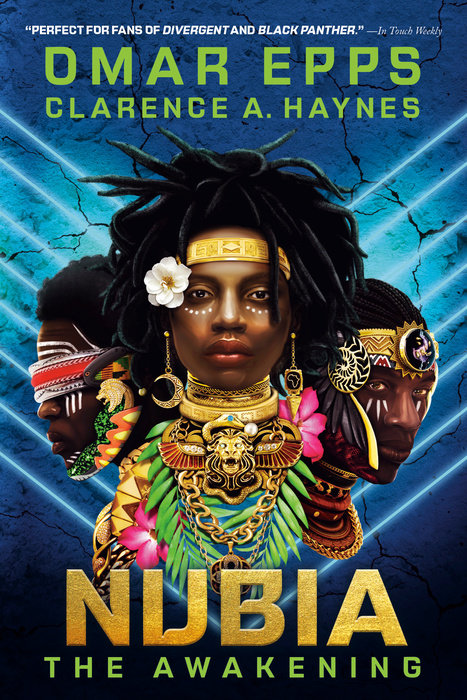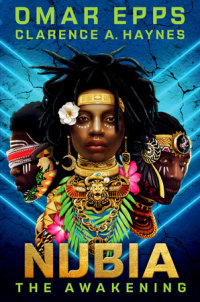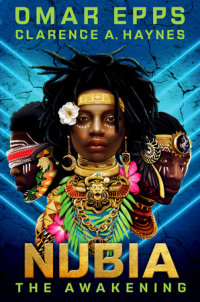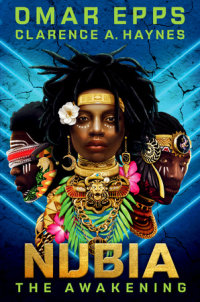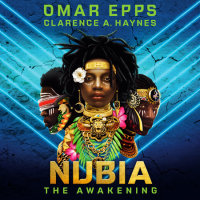Nubia: The Awakening
Nubia: The Awakening is a part of the NUBIA collection.
From beloved actor and producer Omar Epps and writer Clarence A. Haynes comes the biggest epic fantasy of the year. A powerful saga of three teens, the children of refugees from a fallen African utopia, who must navigate their newfound powers in a climate-ravaged New York City. Perfect for fans of Black Panther and Children of Blood and Bone.
For Zuberi, Uzochi, and Lencho, Nubia is a mystery. Before they were born, a massive storm destroyed their ancestral homeland, forcing their families to flee across the ocean to New York City. Nubia, a utopic island nation off the coast of West Africa, was no more, and their parents’ sorrow was too deep for them to share much of their history beyond the folklore.
But New York, ravaged by climate change and class division, is far from a safe haven for refugees, and Nubians live as outcasts, struggling to survive in the constantly flooding lower half of Manhattan, while the rich thrive in the tech-driven sky city known as the Up High.
To many, being Nubian means you’re fated for a life plagued by difficulties and disrespect. But Zuberi, Uzochi, and Lencho are beginning to feel there might be more. Something within them is changing, giving each of them extraordinary powers. Extraordinary and terrifying powers that seem to be tied to the secrets their parents have kept from them.
And there are people Up High watching, eager to do anything they can to become even more powerful than they already are. Now Zuberi, Uzochi, and Lencho will be faced with the choice—do they use their inheritance to lift their people, or to leave them behind. The fate of their city, and their people, hangs in the balance.
An Excerpt fromNubia: The Awakening
Chapter 1
Zuberi
Each punch brought Zuberi a bit closer to peace.
The bag she was working was ancient, peeling in places, with lopsided stuffing that left her knuckles smarting after the beating. She was going to need to do some rehab on it soon, otherwise she’d just be punching leather. Zuberi stepped back from the bag, taking a breath in the cool morning air. She rubbed absently at the silver scar on her chin, tossing her loc’ed hair away from her face as she forced herself to slow her breathing.
Zuberi knew that part of mastering the fighting forms was mastering the breath. It couldn’t be all punching and kicking. Ever since her father had started to train her in Nubian fighting forms, he’d stressed the importance of mindfulness, of honing one’s thoughts before landing each blow. Her father had drilled this philosophy into her brain ever since she was small, when it was her tiny fist connecting with his palm in their living room.
Now Zuberi had more than outgrown training in that living room, mostly because it doubled as her bedroom. So she’d gotten creative, something she’d never had a problem with. Sometimes she’d train in an empty warehouse; other times she’d train in the scraggly Hudson scrapyards with their open access to the river. At school, there was the gym, which she used on occasion. But she preferred places in nature, one of the reasons she made the trek so early to Minerva Park. Nature, with its serenity and stillness, made it easier for her to find an organic connection between the human body and the outer world, an intention deeply embedded in the Nubian forms. Given that the city was mostly devoid of nature, though, she had to rely on the small offerings of trees and shrubs found in Minerva. There, Zuberi had her special hidden places where she could practice, like her little patch off to the side of the abandoned playground where there was a sturdy-enough tree to hang the trusty punching bag she’d bought cheap from one of her neighbors.
She had to admit it felt good to get out of the Swamp, as much as she loved her hood. The Nubian Quarter wasn’t an actual swamp, of course, but that was what everyone had called it for as long as Zuberi could remember. She’d asked her father once why the quarter had been blessed with such a nickname, and he’d just shaken his head. He knew that when Zuberi asked a question—no matter how innocent it seemed—she usually had about five others in reserve.
The Swamp was where most Nubian refugees lived, a last resort after they’d fled their homeland and arrived in New York back in the early-2080s. Nubians couldn’t find even the most menial jobs and were shut out of the renters’ market by landlords, so they had no choice but to lease cheap plots of land held by the government in the city’s abandoned financial district, which had since moved Up High. They’d been expected to fail, or so Zuberi’s father told her. It had been through sheer Nubian will and a sense of community that they’d managed to build and maintain their homes there, humble as they might be.
Nubian will was behind most of the things Nubians had. Zuberi had seen it all her life. Her own father’s determination to pass down the fighting forms was a testament to that, too, how he made sure she not only learned them all but could enact each of them in her sleep.
She turned back to the bag, shifting her weight as she landed more blows before switching to high kicks. She crouched low, her legs shaking from the exertion. She must’ve already been out in the park for at least an hour, and she was feeling it everywhere. Didn’t matter. Pain was part of the process, and she welcomed it with open arms. Punching and kicking and maneuvering around the bag every day helped Zuberi deal with whatever she needed to deal with before she could be a “regular person,” as Vriana liked to put it.
On the next punch, she connected with a sharp corner of the bag. Bright pain zinged up her arm and she stepped back. It was then that she heard a voice, a whisper.
Zuberi’s head whipped around as she sought the source. She didn’t expect to be in the park alone—many people used it for recreation and, in some cases, a home. But this early, it was usually quiet. Zuberi swiped at her brow before catching sight of something stirring in the brush across from her.
“Someone there?” she called out, flexing her fingers.
More stirring. Zuberi swore she heard a sort of gasping sound, followed by a cough.
She bit her lip. It was impossible not to hear her dad’s voice in her head, telling her that this could be a trap and to run away—now. As the head of his own security company, he knew every trick and scam in the book. The city was rife with desperate people, and desperation made people dangerous.
But Zuberi also knew that if some mugger was hiding in the brush, they’d picked the wrong girl.
She took a few tentative steps toward the brush. As she got closer, a cool April breeze kicked up, making her shiver. She blinked at the dust stirred up around her, then opened her eyes again.
There.
At first, Zuberi didn’t know what she was seeing. It was like a wisp of air, something both completely there and not, like a spark of electricity zipping over an exposed wire. Here and gone again, more than shadow but not by much. A wisp of a figure, barely discernible in the haze of morning. She blinked again, thinking the morning’s exertion was getting to her.
And that was when the wisp sharpened.
A woman appeared, with long braids over her shoulders and eyes that glowed in the beams of sunlight that fell through the branches of the trees. Her gaze settled on Zuberi, piercing, unforgiving. She wore long robes, her arms crossed. Zuberi felt as if she was being judged, but for what?
The woman’s eyes drifted down, and Zuberi started. There, on the ground, two feet poked out from behind a tree. A woman—the same woman who Zuberi saw clearly floating just above—was passed out, tucked into a hollow in the tree trunk beneath an array of branches that held a school of nu-raves. Her eyes were closed, her head slumped forward. Her skin was tinged purple, drool dribbling down her chin.
Zuberi recoiled.
Goddess . . .
She knew what she was seeing, even if she’d never seen it so up close before. She knew by the way the woman’s veins swelled on her hands and how her cheeks hung slack that these were the signs of Elevation.
Elevation. Even the drugs that swarmed the city were laced with promises of Up High living. It made Zuberi’s stomach churn, especially now, as the woman in front of her twitched.
But while Elevation explained the woman’s condition, it didn’t explain the figure floating above her. The woman continued to stare down at her in judgment, through and through. That gaze, it reminded Zuberi of her father and her aunties. It reminded her—
Suddenly, the figure was gone. Zuberi squinted, then closed her eyes, then opened them again. The air was clear, empty. She stepped back, crossing her arms and squeezing them tight to her body. She felt dizzy.
She’d pushed herself too hard, clearly. Hallucinations were a problem with dehydration and overexertion. Her father told her so all the time. And when Zuberi looked back up at her empty water bottle, she knew she’d done way too much this morning.
Below her, the woman groaned, and Zuberi stepped back. Part of her wanted to wake the woman up, make sure she was okay. It was what Vriana would do, after all. But then she remembered her father’s warning about strangers yet again.
So she left, deeply uneasy as she made her way home to shower and get ready for another day at High School 104. It would’ve been easier to do if all she had to worry about was class, but the woman’s eyes followed her every step of the way, vicious and narrow no matter how Zuberi tried to shake them off.
By the time she reached the worn façade of 104, the morning had brightened. She entered the building and passed through the Taser and e-dagger detectors, finding the campus mostly empty since it was still fairly early. She could hear the occasional sounds of lectures droning through classrooms, signs of life thanks to those who took on the extra zero period. Beyond that, there were small knots of students leaning against concrete walls or huddled around benches. She saw one kid with a heavy marker drawing long black lines down the side of a slab of concrete, his moves lazy and unhurried. She watched to see what he was writing, though she had her guesses. Judging by the sun emblem on his jacket, he ran with the Divine, one of the gangs her father was always chasing away from the stores he ran security for.
“Beri!”
Zuberi jumped at the sound of her name, though as soon as Vriana appeared beside her, she relaxed. It was as instant as a hot bath, the way her best friend could always make her feel better. No matter what was going on, Vriana was the salve.
“Girl, I’ve been looking for you everywhere,” Vriana said, pulling her into a quick embrace. “I’m exhausted and it’s only morning.”
Zuberi laughed. “Sorry. Just got here. What’s up?”
Vriana flashed a toothy grin as she took hold of Zuberi’s arm, guiding her to a nearby bench to sit. “I want to go check out those boys from the Divine Suns who’re running track this morning,” she said. “Did you see their muscles? Mm, mm, mm, oh-so-fine Divine.”
Zuberi grinned and shook her head. Another day, another Vriana crush. They came in waves, almost as dependable as the dawn of a new day. It wasn’t as if the love wasn’t reciprocated, either. Zuberi would bet currency that her best friend was one of the most crushed-on kids in their grade. Even non-Nubian kids flirted with Vriana, a feat that Zuberi would’ve declared next to impossible given the rampant prejudice Nubians faced.
Of course, it wasn’t hard to see why people fell for Vriana, considering she was beauty incarnate. Where Zuberi was athletic leanness with a streamlined, subtle personal style, Vriana was effortless curves wrapped in trendsetting fashion. Today, she was wearing dark blue jeans with lightning-bolt rips on the thighs, paired with a neon-pink kente tee knotted just above her hip to show off a sliver of skin. Vriana had a warmth that shone through all over, from the way she spoke with her hands to the gleam in her brown eyes, often accentuated with a rainbow of colors that Zuberi knew she never could’ve pulled off. Today, Vriana had lined her eyes in silver and gold, a perfect counterpart to her navy-and-magenta braids, which were swept up in a side bun. With her braids up, Zuberi could see the thin plate earring that Vriana always wore.
